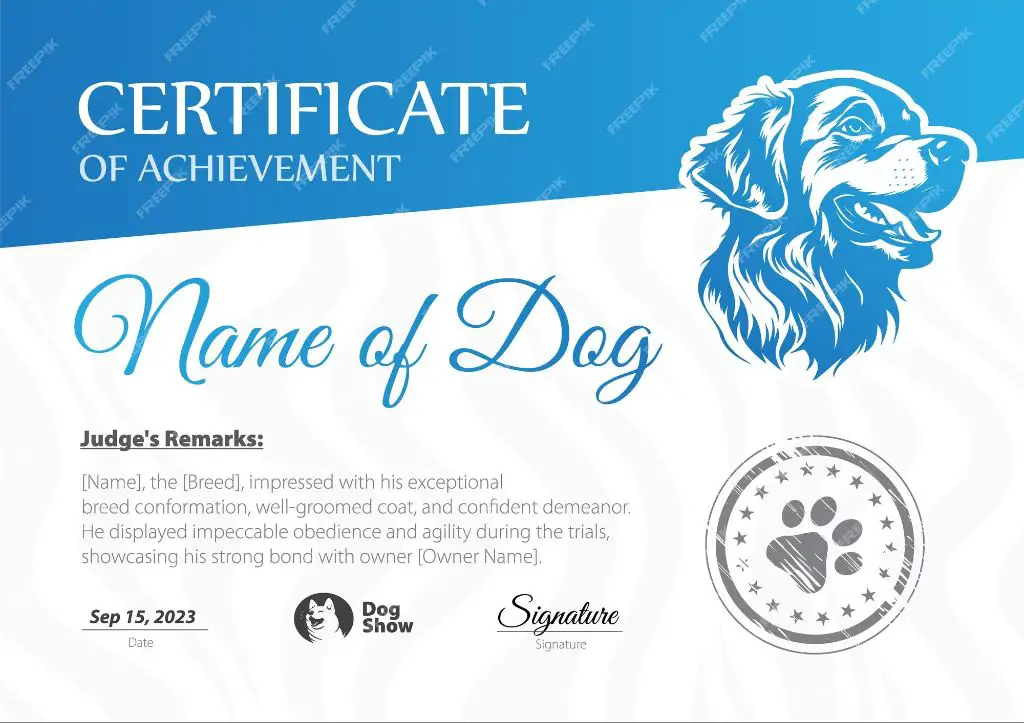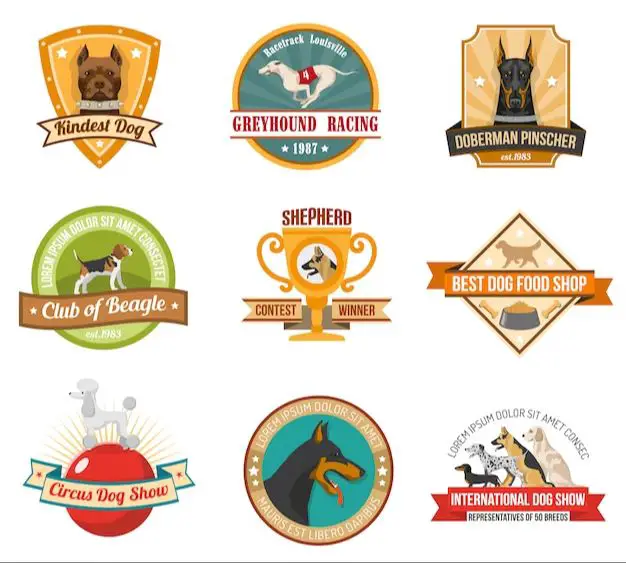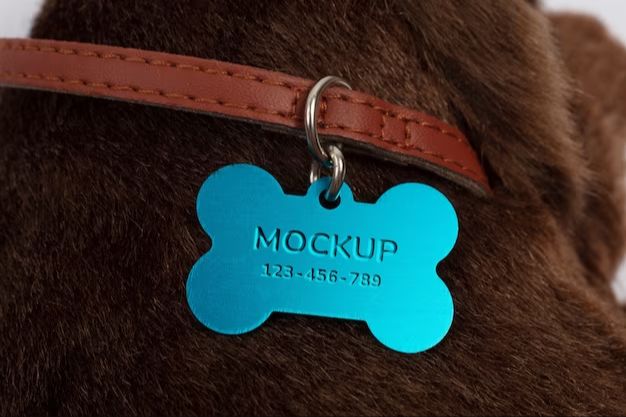Introduction
Giving your dog an official registered name is important for several reasons. Having an official name allows you to obtain pedigree records, compete in dog shows and sporting events, and breed your dog. It also provides a unified identity for your dog across kennel clubs and breed registries. An official registered name adds prestige and legitimacy for purebred dogs. Overall, it gives your pup a sense of heritage within your breed’s community.
AKC Registration
The American Kennel Club (AKC) is the largest purebred dog registry in the United States. Registering a dog with the AKC provides an official pedigree record and allows the dog to participate in many AKC events such as dog shows, performance events, and trials. Here is an overview of the AKC dog registration process:

To register a dog with the AKC, you must fill out an application and submit it along with the required registration fees. The main pieces of information you will need to provide are:
- Your name, address, and contact information as the primary owner
- The dog’s date of birth
- The dog’s breed
- The registered names of the dog’s sire and dam
You will also need to provide proof of ownership and sign a contract stating you are the legal owner of the dog. Once submitted, it usually takes between 4-6 weeks to receive the official AKC registration certificate in the mail.
Other Kennel Club Registrations
In addition to the American Kennel Club (AKC), there are other major kennel clubs around the world that also register purebred dogs and maintain their pedigrees. Here is an overview of some of the top kennel clubs and their registration processes:

The Kennel Club (KC) – The UK’s kennel club, founded in 1873. The registration process is similar to AKC. Breeders must register the litter, and new owners can then register their puppy and receive registration documents. Dogs must be purebred and pedigree verifiable. Names go through an approval process and follow conventions.
Canadian Kennel Club (CKC) – Canada’s kennel club, founded in 1888. They maintain breed standards and registries, sanction events, and promote purebred dogs in Canada. The registration process involves litter registration by the breeder, then individual registration by the owner. There are naming conventions to follow.
United Kennel Club (UKC) – A US club, founded in 1898, that maintains its own pedigree registry. They have an open registration system that includes purebreds and mixed breeds. Owners simply fill out an application with their chosen name, no litter preregistration required. Names just need to meet general guidelines.
The Kennel Club of India (KCI) – The national kennel club of India, established in 2010. They register purebred dogs and maintain breed standards. Puppies must be registered by the breeder before owners can receive registration certificates. Names undergo scrutiny and must meet conventions.
Australian National Kennel Council (ANKC) – The peak body for Kennel Clubs across Australia, formed in 1958. ANKC affiliates like Dogs Queensland handle registrations. The breeder must first register the litter before owners can register individually. Names follow conventions and rules.
Naming Conventions
There are some common naming conventions that have developed among pedigree and show dog circles over the years:
– Use distinctive alliteration – Repeating initial letters in a dog’s name makes it more memorable. Examples: Bonnie’s Best in Show, Charlie’s Clockwork.
– Incorporate kennel name or breeder – Including the kennel name or breeder as part of the dog’s name identifies its lineage. Examples: Winston of Westwood Kennels, Jane’s Golden Boy.
– Add titles or traits – Titles like Lord or Lady, Duke or Duchess are popular. Describing traits like color or temperament also common. Examples: Princess Leia, Emperor’s New Clothes, Snowy.
– Use show themes – Names may reflect classic literature, royalty, food and drink, mythology, astronomy, geography, and more. Examples: Barcelona, Jupiter, Pompeii, Zeus, Napoleon.
– Keep it simple – Short names with 1-2 syllables work best for show announcements and responding to commands. Examples: Rex, Dale, Rose, Winnie.
Choosing a Name

When choosing a name for your dog, you’ll want to pick something appropriate and meaningful. Here are some tips:
Opt for 1-2 syllables. This makes the name easier for your dog to recognize and remember. Stick with softer sounding consonants like “l”, “m”, “n”, “v”. Avoid harsher consonants like “k”, “z”, “x” which are more difficult to pronounce.
Make sure the name is distinct from commands. Names that sound like “no”, “sit”, “stay” can confuse your dog during training.
Consider names with positive meanings related to traits you want your dog to have – like loyalty, bravery, friendliness. This helps reinforce those qualities.
You may want to choose a name reflecting your dog’s appearance, breed, personality or other attributes that inspired you. Endearing names based on foods, place names, human names, etc. are popular options too.
Have fun with alliteration or rhyming names if you like wordplay. Just keep the name easy to say and not too long.
Test out a few frontrunner names for a couple days to see what flows and feels right when interacting with your dog. An ideal name will stick easily and capture your dog’s personality.
Name Approval
When registering a dog with the AKC, the name you choose must be approved before it becomes the dog’s official registered name. This process ensures that names meet certain guidelines and prevent duplicate names from being registered.
The AKC reviews each proposed name carefully before approving or rejecting it. There are a few rules your chosen name must follow:
- The name can’t exceed 36 characters, including spaces and punctuation.
- Words or phrases that are similar to existing names won’t be allowed.
- Offensive, vulgar, or suggestive language can’t be used.
- Breeder kennel names can only be used with permission.
The AKC wants names to be distinctive yet reasonable. They recommend choosing a name that describes the dog’s qualities, personality, appearance, or ancestry. References to the breeder’s kennel name or ancestry names are common.
If the AKC rejects your proposed name, they will let you know the reason. You can then submit another choice. There is no limit on how many times you can resubmit.
Once the name is approved, you will receive paperwork with the official registered name. This unique name will stay with the dog for life and be used on pedigrees and in competitions.
Change Request
If you want to change your dog’s registered name after you have already registered with a kennel club, the process differs slightly depending on the organization.
For AKC registered dogs, you need to fill out and submit the Dog Name Change Request Form along with the name change fee. This usually costs around $25-35 depending on your membership status. The new name should follow all AKC naming guidelines and rules. Once approved, you will receive an updated registration certificate with the new name.
For other kennel clubs like the UKC, you can submit a request by mail or email. The fee is usually around $25. Make sure to specify the old name, new name request, dog’s registration number, breed, your contact information and reason for the change. Once the change request is processed, an updated registration will be issued.
Keep in mind most kennel clubs limit the number of name changes allowed per dog registration. So make sure you choose a name carefully the first time before submitting!
Littermate Names
When registering a litter of puppies, it’s common for breeders to coordinate the names. This helps identify the puppies as littermates and makes record keeping easier.
Some tips for coordinating littermate names:
- Use a theme – Pick a theme or letter and ensure all names follow it (e.g. flower names, names starting with “B”)
- Use a naming convention – Use the kennel name or themes in a structured way (e.g. “KennelName’s Puppy One”, “KennelName’s Puppy Two”)
- Identify the order – Include a numeral, letter, or word that identifies each puppy’s birth order (e.g. Sparkle One, Sparkle Two, etc.)
- Make them rhyme – Choose names with similar sounds or rhyming patterns
- Keep the length consistent – Use names of similar syllable length
- Consider suffixes – Use the same suffix for all names like “of [KennelName]” or “-pup”
Coordinating littermate names makes it clear the puppies belong together while still giving each their unique identity.
Call Name vs Registered Name
There is a difference between a dog’s call name and registered name. The registered name is the dog’s official name as registered with a kennel club. It follows certain rules and guidelines. The call name, on the other hand, is an informal name used to call the dog on a daily basis. It does not have to follow any specific rules.

A dog’s registered name is usually longer and more elaborate than the call name. Registered names often include the kennel name along with descriptive words about the dog’s appearance or lineage. For example, “Wonderland’s American Dream” could be the registered name. The call name for that dog may simply be “Dreamer.”
While the registered name must be unique and has certain restrictions, the call name can be more casual. Call names are often short one or two syllable names that are easy to say and remember. Registered names are primarily used for official documentation and events. The call name is used in everyday interactions.
Having two separate names prevents confusion. The registered name maintains the dog’s identity in formal breeding and competition records. The call name allows families to choose a simple, comfortable name for training and living with their pet.
Conclusion
In summary, the process for officially naming a dog depends on whether you plan to register your dog with a major kennel club like the AKC. Registration provides your dog with an official pedigree and the ability to participate in various dog sports and competitions. When choosing an official registered name, it’s important to follow the naming conventions and guidelines of the specific kennel club. Some key tips are keeping the name under 36 characters, avoiding duplicate names, and making sure the name is not offensive or insulting.
While you can choose any call name for your pet’s everyday use, the registered name is important for establishing your dog’s identity and lineage. Overall, putting thought into your dog’s official name is an exciting chance to commemorate your new pup. Just be sure to follow the proper process through a trusted kennel club to make it official.